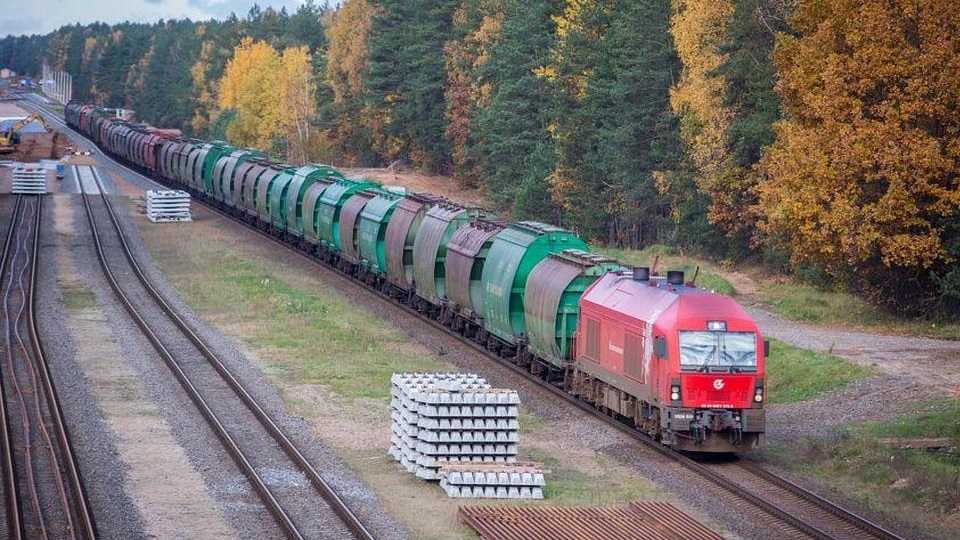Lithuania scrambles to find new routes after Belarus ban

As Belarus has banned trains from Lithuania carrying fertilisers and oil products from crossing its territory, Lithuania is scrambling to find new routes for its Belarus-bound freight. Lithuanian operator LTG says Poland and Latvia are the most suitable for the rerouting, however, critics have called the plans little economically viable.
The Belarusian ban came in response LTG terminated its transit contract with Belarusian fertiliser producer Belaruskali, as this company had been subjected to US sanctions. Although the ban on Lithuanian transit products involves only fertilisers and oil products, it hits the rail freight market hard. On average, around 18 trains travel from Lithuania to Belarus every day, and their cargo mainly consists of oil products, fertilisers, and ferrous metals.
Lithuanian Railways, the Baltic country’s state-owned railway company, says the cargo flow to Belarus is estimated to drop by more than 10 per cent, with the number of trains crossing the Belarusian border about to drop by 45 per cent to 480-540 per month. So, at which costs is it worth rerouting this cargo?
‘Transportation costs will rise’
Although rerouting seems inevitable, the alternative through Poland will make the whole transporting process more expensive, explained Mindaugas Skritulskas, a member of parliament. “This is due to the need to change to another railway gauge twice, first when entering Poland and then again when entering Ukraine. The process will take longer and cause certain inconveniences as a result.”
“One needs to take a look at the map and see what loop the trains will need to make – one too big and too curvy. Besides, reloading and/or shunting in between would be inevitable. All of that would result in a hike of the price of the transportation”, agrees Sigitas Besagirskas, a prominent Lithuanian economist and president of the Vilnius Industry and Business Association (VIBA).
“Lithuania can perhaps use the option of Poland, Ukraine and some other countries in the short-term, but, in the long-term, that will turn out to be too expensive”, he added. Another challenge is that the re-routing would require services of multiple intermediary railway transportation companies, and the more players are involved, the more complicated and expensive things become, Besagirskas explained.
LTG Cargo: long-term diversification
But LTG Cargo, the cargo arm of LTG, is seemingly downplaying the caveats and speaks about a long-term diversification of its services and an expansion to Poland and Ukraine.
“Preliminary calculations are currently being carried out on how goods can be transported through Poland to Ukraine, Turkey or other more eastern destinations. In developing alternative routes through Poland, it will be important to assess an array of aspects, such as the length of a route and the duration, as well as the route organisation processes in Poland, specifically freight reloading due to the different track gauge standards”, Kotryna Dzikaraitė from LTG Cargo told RailFreight.com
Border crossings
When transporting shipments via an alternative corridor, trains from Ukraine could enter Poland via one of the two or three borders, and from Poland to Lithuania through the Trakiškis (Mockava) border checkpoint, she explained.
Trains from Lithuania that are still allowed to transit Belarus, will go to Russia and Ukraine, as well as Kazakhstan, Uzbekistan and Tajikistan, LTG Cargo says. They would carry various cargoes not covered by the Belarusian ban and would include food and plant-based products as well as equipment.
Lithuania did its homework
With this long-term plan in mind, LTG Cargo set up a subsidiary for the expansion in Ukraine. LTG Cargo Ukraine has already started providing locomotive rental and shunting services and wagon rental services last year, and from this year it also provides freight forwarding services.
Meanwhile, LTG Cargo’s new arm in Poland, LTG Cargo Polska, has leased two new locomotives and two train wagons this year, as well as announced investing over 47 million euros in Poland in the next 2-3 years. These investments will be used for the development of new and existing services and the acquisition of a technical fleet, LTG Cargo says.
60-million-euro yearly loss
In 2021, LTG Cargo hauled 11.9 million tons of Belaruskali freight, of which potash fertilisers accounted for 11.6 million tons and oil products of Belorusskaya Neftyanaya Kompaniya 88 300 tons.LTG Cargo estimates it will lose approximately 60 million euros yearly due to the cut of Belaruskalij shipments.
Last year, LTG Cargo carried 1.6 million tons of freight via the Belarusian railways, whereas the total tonnage of handled freight stood at 51.1 million tons. The Lithuanian company plans to ship 38.8 million tons of freight this year.
Rail Freight On Tour-The Lithuanian Edition
Are you interested in Lithuania’s rail freight potential? Do you want to get acquainted with the market, meet possible partners and explore business opportunities? Then the Rail Freight On Tour-The Lithuanian Edition is the right event for you!
On 5-6 April 2022, RailFreight.com travels to Vilnius, Lithuania, for the first-ever edition of the RailFreight on Tour travelling event concept, in collaboration with Lithuanian Railways. Do you want to join us? You can register here, and take a look at the programme outline here.
Also read:
- Belarus ready to ban rail traffic coming from Lithuania
- Lithuania leaves no room for Belarusian fertilisers
- No space for Belarusian fertilisers in the Baltics after US sanctions
- Lithuanian Railways stops Belarusian fertilisers due to US sanctions
- Lithuania fumbles with transport Belarusian fertilisers after US sanctions
You just read one of our premium articles free of charge
Want full access? Take advantage of our exclusive offer





